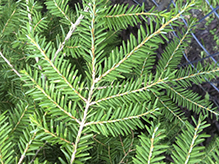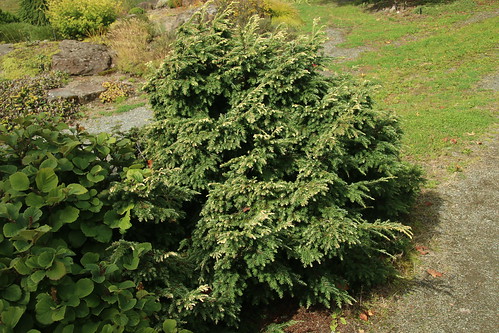eastern hemlock
(Tsuga canadensis)
Conservation • Wetland • Description • Habitat • Ecology • Use • Distribution • Taxonomy
Description |
||
Eastern hemlock is a slow growing, long-lived, medium-sized, coniferous tree. It rises on a single trunk from a shallow, wide spreading root system. In Minnesota mature trees are usually 40′ to 60′ tall and up to 24″ in diameter at breast height. In other areas individuals can reach 98′ in height and 40 ″ in diameter. The trunk is tapered, straight, and distinct to the top of the tree. The crown on younger trees is dense and broadly cone shaped. The slender leading shoot at the tip of the crown droops in the direction of the prevailing wind in the spring, but usually straightens out later in the year. On older trees the crown is uneven and the branches are irregularly spaced. The branches are slender and horizontally spreading with drooping tips. Dead branches remain on the lower trunk for years. The bark on young trees is reddish-brown to purplish-brown; thin; and broken into thin, roundish or irregular scales. On mature trees the bark is reddish-brown to gray and thicker. The scales are thicker and are broken into vertical ridges and furrows. On older trees the bark is thick with deep furrows. The ridges are often broken horizontally into irregular blocks. On mature and older trees newly exposed bark is reddish-purple. First year twigs are greenish- or yellowish-brown and densely hairy. Older twigs are brown or grayish-brown and hairless. The twigs are slender and flexible. They are rough to the touch due to a forward-pointing, peg-like projection at the base of each leaf that persists after the leaf has fallen. Side branches on the twigs are arranged on a flat plain. The buds are egg shaped, rounded at the tip, reddish-brown, non-resionous, hairy, and 1 ⁄16″ to ⅛″ long. The leaf scars are raised, forward facing, rough, and reddish brown. The needle-like leaves are alternate and evergreen, remaining on the twig about 3 years. They are attached to the twig on a short, thread-like stalk (petiole). The petiole is twisted or bent causing the leaves to appear two-ranked. Each leaf is linear, flat, flexible, and ⅜″ to ¾″ long. Unlike a spruce leaf, it will not roll easily between thumb and forefinger. It is rounded at the tip and at the base. The upper surface is shiny and dark green. The lower surface is similar but with a row of tightly-spaced white dots on each side of the midrib. Each white dot (stomate) is a pore surrounded by two glaucous guard cells. When crushed, the leaves emit an odor similar to the herbaceous species hemlock (Conium). Male and female flowers are borne on the same tree. Pollen (male) cones arise from clusters of yellow flowers in the lower part on the crown. They rise at the end on a greenish-white scaly stalk from leaf axils near the end of second-year branchlets. The cones are globe shaped, yellow, and about ⅜″ in diameter at maturity. In Minnesota they shed pollen in May or early June, about two weeks after leaf buds burst. Female cones hang downwards singly at the tips of second-year branchlets in the upper part of the crown. They are ⅜″ to ¾″ long, ellipse shaped when closed, egg-shaped when open. The scales are thin, egg-shaped to wedge-shaped, 5 ⁄16″ to ½″ long, and ¼″ to ⅜″ wide. They are rounded at the tip and project outward. Female cones reach full size in late August to early September, open in mid-October, and remain on the tree for more than a year. The seeds are small and have large wings. Seeds are dispersed throughout the winter. |
||
Height |
||
40′ to 60′ |
||
Record |
||
There are two co-champion eastern hemlocks in Minnesota. The first is on private public near Minneapolis, in Hennepin County. In 2018 it was measured at 74′ tall and 87″ in circumference (27¾″ in diameter), with a crown spread of 39′. The second is on private property near Cottage Grove, in Washington County. In 2019 it was measured at 65′ tall and 100″ in circumference (31¾″ in diameter), with a crown spread of 39′. |
||
Habitat |
||
Moist, rich, acidic, well drained soil. Mixed forests. Partial shade to partial sun—very shade tolerant. |
||
Ecology |
||
Pollination |
||
May or early June |
||
Pests and Diseases |
||
Hemlock woolly adelgid (Adelges tsugae) |
||
Use |
||
|
||
Distribution |
||||
|
Sources: 2, 3, 4, 5, 6, 7, 8, 24, 28, 29, 30. The sighting in Crow Wing County is at the Northland Arboretum in Brainerd. Arboretum plants are not normally included in the range maps. In this case, however, the sighting is on a The Nature Conservancy sight, Paul Bunyan Savanna, which is a part of the Northland Arboretum but is also a natural site. The sighting in Washington County (light green on the map) is at Carpenter St. Croix Valley Nature Center. It was probably planted by the original owners of the property along with many other trees not native to the area. |
|||
| 4/14/2023 | ||||
Nativity |
||||
Native |
||||
Occurrence |
||||
Rare, localized, and imperiled |
||||
Taxonomy |
|||
| Kingdom | Plantae (Plants) | ||
| Subkingdom | Pteridobiotina | ||
| Phylum | Tracheophyta (Vascular Plants) | ||
| Class | Pinopsida (conifers) | ||
| Subclass | Pinidae | ||
Order |
Pinales (conifers) | ||
Family |
Pinaceae (pine) | ||
| Subfamily | Abietoideae (firs, hemlocks, cedars, and allies) | ||
Genus |
Tsuga (hemlocks) | ||
Subordinate Taxa |
|||
|
|||
Synonyms |
|||
Pinus canadensis |
|||
Common Names |
|||
Canada hemlock eastern hemlock eastern hemlock-spruce hemlock hemlock spruce |
|||
Glossary
Linear
Long, straight, and narrow, with more or less parallel sides, like a blade of grass.
Petiole
On plants: The stalk of a leaf blade or a compound leaf that attaches it to the stem. On ants and wasps: The constricted first one or two segments of the rear part of the body.
Stomate
A minute, epidermal pore, surrounded by two white guard cells, that allows the exchange of gasses and water vapor. The guard cells control the size of the opening. Plural: stomata.
Wing
A thin, flat, membranous, usually transparent appendage on the margin of a structure.
Visitor Photos |
|||||
Share your photo of this plant. |
|||||
| This button not working for you? Simply email us at info@MinnesotaSeasons.com. Attach one or more photos and, if you like, a caption. |
|||||
Randy |
|||||
Eastern hemlock foliage, Freeborn County, MN, July 2017 |
|||||
 |
|||||
MinnesotaSeasons.com Photos |
|||||
|
|||||

Visitor Videos |
|||
Share your video of this plant. |
|||
| This button not working for you? Simply email us at info@MinnesotaSeasons.com. Attach a video, a YouTube link, or a cloud storage link. |
|||
Other Videos |
|||
| Trees with Don Leopold- eastern hemlock ESFTV |
|||
About
Uploaded on Oct 10, 2011 No description available. |
|||
| eastern hemlock (tsuga canadensis) identification video wvoutdoorman |
|||
About
Published on Apr 18, 2012 eastern hemlock (tsuga canadensis) helping id the plant |
|||
| MyNature Apps; Identifying an Eastern Hemlock, Tsuga canadensis MyNatureApps |
|||
About
Uploaded on Mar 30, 2011 How to Identify an Eastern Hemlock Tree. www.mynaturesite.com |
|||
| Eastern Hemlock [Plant ID Guide] BlackOwlOutdoors |
|||
About
Published on Mar 9, 2013 Krik of Black Owl Outdoors identifies and explains some of the characteristics of Tsuga canadensis, or the Eastern Hemlock. |
|||
| Eastern Hemlock Identification Matthew Loxley |
|||
About
Published on Oct 21, 2012 No description available. |
|||

Created: 7/1/2014
Last Updated:




